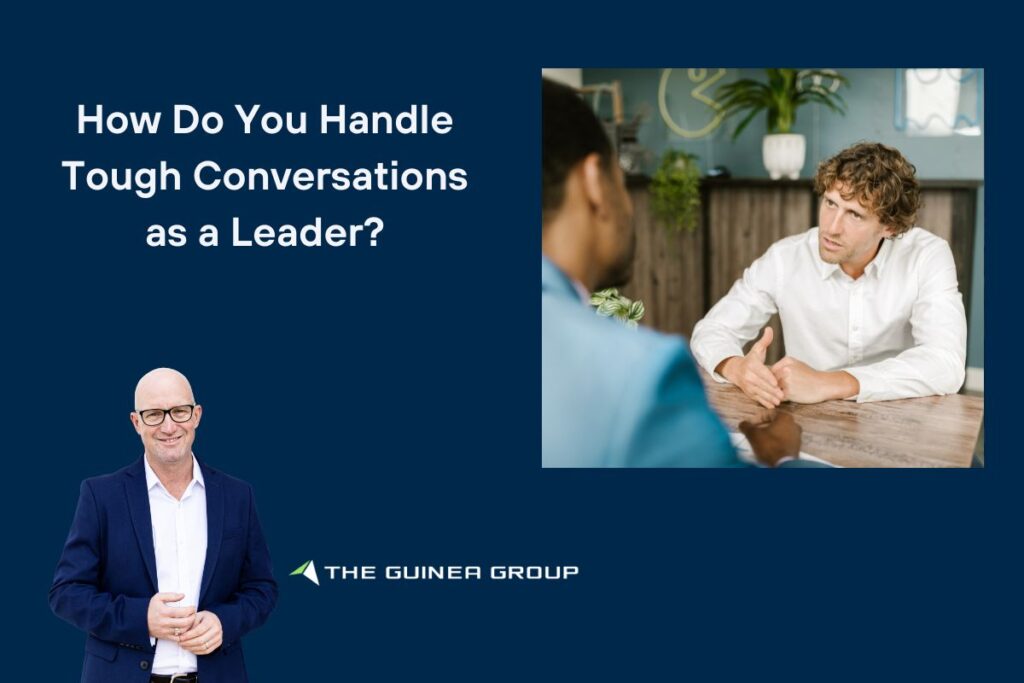Anton Guinea
Entrepreneur, Speaker, bestselling author, and founder of The Guinea Group of Companies. For over 15 years, Anton has helped leaders move their teams to become psychologically safe, physically safe and overall better versions of themselves.

How Do You Handle Tough Conversations as a Leader?

Have you ever found yourself dreading a tough conversation so much that you’d rather avoid it entirely?
I know I have. But if there’s one thing I’ve learned over decades of leadership training and coaching across Australia, it’s this—tough conversations are unavoidable, but avoiding them only makes things tougher.
Tough Conversations Are About Honesty and Respect
Tough conversations are rarely enjoyable, but they’re crucial. Whether it’s addressing poor performance, giving critical feedback, or discussing uncomfortable topics, these interactions define you as a leader. I’ve learned firsthand that approaching these moments with honesty and respect not only resolves issues faster but strengthens relationships in the long run.
The key is not to sugarcoat the truth. Instead, deliver your message clearly and respectfully. This lets the other person feel valued, even if the message itself is difficult to hear. Here’s a great resource on giving tough feedback without hurting morale.
Preparation Is Your Best Ally
Walking into a difficult conversation unprepared can escalate tensions quickly. I always take time to clearly outline the points I need to address and anticipate reactions. By preparing thoroughly, you can remain calm and clear-headed throughout the discussion, ensuring it stays productive rather than emotional.
If you’re unsure how to prepare, start by writing down the key points you need to address. Consider potential responses and think about how you might handle different reactions. This small effort beforehand can make a significant difference in the outcome.
Embrace the Silence
One surprising lesson I’ve learned about difficult conversations is the power of silence. Often, as leaders, we feel pressure to fill awkward gaps. But allowing space after delivering your message lets the other person process the information. Don’t rush through silence—it often leads to deeper, more meaningful discussions.
In fact, silence gives the other person room to respond authentically rather than defensively. It’s a simple technique I’ve found incredibly effective. This article discusses the importance of silence in leadership communication.
Address Issues Early
The longer you wait to address an issue, the harder the conversation becomes. One of the biggest mistakes I made early in my career was delaying tough conversations in the hope that problems would resolve themselves. Spoiler alert—they rarely did.
Instead, I’ve learned to tackle issues as soon as I notice them. Early intervention can prevent minor issues from becoming major conflicts, saving everyone involved unnecessary stress. It’s about being proactive, not reactive.
Be Specific, Not General
Generalised feedback rarely leads to positive outcomes. If someone on your team is underperforming, avoid vague statements like, “Your performance isn’t meeting expectations.” Be specific. Clearly identify behaviours or actions that need to change, and suggest concrete steps for improvement.
This level of specificity helps people understand exactly what’s expected, reducing confusion and anxiety. It also demonstrates your genuine interest in their growth, not just criticism.
Offer Solutions, Not Just Problems
A tough conversation isn’t about assigning blame—it’s about finding solutions. Whenever I approach difficult discussions, I always bring potential solutions or pathways forward. This shifts the conversation from blame to collaboration, making it easier for everyone involved.
Encourage your team members to suggest their own solutions, too. When people feel they’re part of the solution, they’re more likely to commit to change.
Follow Up and Support
The conversation doesn’t end when the meeting does. Effective leaders follow up after tough discussions, ensuring clarity and providing support. I always make it a point to check in, offer assistance, and recognise progress. This shows you genuinely care and strengthens your leadership presence.
If you’re looking to improve your approach to difficult conversations, I’m here to help. I regularly run workshops and coaching sessions focused on mastering these essential leadership skills.
Tough Conversations Build Stronger Leaders
Each difficult conversation you handle with grace and respect makes you a stronger, more trusted leader. Remember, leadership isn’t about avoiding the hard stuff—it’s about facing it head-on, confidently and compassionately.
If you’d like to dive deeper into this topic, contact me here. Let’s turn your tough conversations into opportunities for growth.
Please click the image below if you’d like to chat about what leadership means to you

If you would like to learn more about Anton or The Guinea Group, please click here to book into Anton’s calendar, to:
UPGRADE your Mindset
UPSKILL your Leadership
UPLIFT your Teams
About Anton
Anton has dedicated his working life to helping leaders to upgrade their mindset, upskill their leadership, and uplift their teams! With a focus on helps leaders to better lead under pressure. Anton is an entrepreneur, speaker, consultant, bestselling author and founder of The Guinea Group. Over the past 19 years, Anton has worked with over 175+ global organisations, he has inspired workplace leadership, safety, and cultural change. He’s achieved this by combining his corporate expertise, education (Bachelor of HR and Psychology), and infectious energy levels.
Work With Anton!
Subscribe to our Newsletter